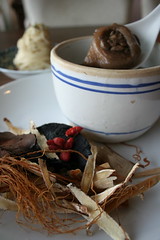[youtube]http://www.youtube.com/watch?v=g6tIbpJE7CY&feature=related[/youtube]
Healing after a surgery is usually not the most pleasant time for anyone. Most people expereince some amoutn of pain, nausea, vomiting, dizziness, lack of lucidity, and other various side effects from the pain medications. While it is necessary to manage the pain in an efficient and quick manner, it is possible in a lot of cases to do it without the use of drugs. Pain drugs, such as morphine, have to be metabolized while your body is trying to put all of it's energy into healing.
Acupuncture helps to release endorphins, or the natural "pain killing" mechanism the body already has. It's very safe, and contributes to the healing of the wound created by the surgery, and body acu-points that aren't near the surgical site can be used to stop the pain. Electroacupuncture machines may also be used, as it's easier to turn the current up or down according to the patients comfort level. The use of acupuncture and even massage can speed up the process much faster than without it.
There are a lot of great Chinese herbal medicine remedies for post-surgical trauma as well. The burn salve Ching Wan Hung, which also has skin-regenerating properties. For wounds that continue to bleed or have a lot of bruising, Yunnan Bai Yao can be used to help stop the internal bruising and external bleeding. This "secret" formula comes in many different and easy to use forms, such as plasters, powder, capsules and sprays. It is inexpensive, and can be found in most Chinese Medicine grocery stores and Asian grocery stores
It's important to remember that movement can be key with healing (depending on the surgery, of course). Getting up and walking helps move the blood around, instead of letting it stagnate which can lead to pain. While cool foods might seem like a good idea, it's also important to eat warm and nourishing foods to help you heal, such as soups, herbal teas, and meat broths to help build up strength.
For more information, here is another site that gives information on why acupuncture should be used after cosmetic surgical procedures, and Medscape had more on postoperative pain management.
Keep in mind that all of these tips can also be applied to animals undergoing surgery- their response to Chinese Herbal Medinice and acupuncture can be very similar to humans!


